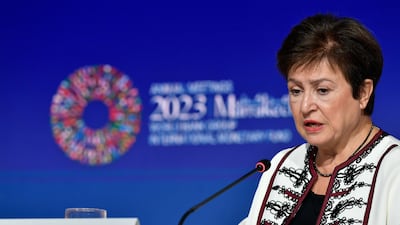Containing inflation, safeguarding the financial markets’ stability and rebuilding fiscal buffers to better withstand shocks are the top policy priorities for the International Monetary Fund this year, it managing director has said.
Successive crises since 2020 have pushed global output down by $3.6 trillion as of this year, however, shocks are becoming a “new normal” in a weakened world suffering from economic fragmentation, Kristalina Georgieva said in a media briefing on the sidelines of the World Bank and IMF annual meetings in Marrakesh on Thursday.
“Price stability is a prerequisite for growth as it also protects people, especially the poorest members of society,” Ms Georgieva said.
“Second, we need to save the financial stability. As we have seen in recent weeks from the moves in bond yields in the US and Europe, markets have been adjusting in an orderly way to the realisation that interest rates would stay higher for longer, but a sudden further tightening of financial conditions could hit markets, could hit banks and non-banks [entities], which is why strong financial supervision is essential.”
After a period of increased public spending, as the world recovered from the aftershocks of the coronavirus pandemic, nations need to rebuild and replenish their fiscal buffers, Ms Georgieva said.
Shoring up fiscal buffers will help countries to be able to “respond to future shocks, make vital investments and bring down debt”, she said.
“In most cases, this means tighter and better targeted fiscal policy. Reprioritising spending and mobilising domestic revenues, especially in emerging markets and low‑income countries, is now even more important.”
The world economy recovered well from the pandemic-driven slowdown in 2020 that pushed it into one of its worst tailspins since the 1930s.
However, the pace of recovery has slowed significantly, marred by a sharp rise in inflation that hit the highest level in decades in Europe and the US last year.
To bring consumer prices back to their target range, central banks have been raising interest rates sharply, which has also subdued economic momentum.
Earlier this week, the IMF maintained its forecast for global growth for this year but revised it marginally lower for next. It said the world economy is on the path of recovery, however growth remains slow and uneven.
The fund kept its global economic growth projection for this year at 3 per, slower than the 3.5 per cent expansion recorded in 2022. The latest projection in the World Economic Outlook report is below the historical growth average.
For 2024, the IMF expects the world gross domestic product to expand by 2.9 per cent, a 0.1 percentage point downgrade for next year from the fund’s forecast in July.
Global inflation is forecast to decline from 8.7 per cent in 2022 to 6.9 per cent in 2023 and 5.8 per cent in 2024. But the forecasts for 2023 and 2024 are revised up by 0.1 percentage point and 0.6 percentage point, respectively.
“Core inflation, which excludes food and energy prices, is also projected to decline, albeit more gradually, to 4.5 per cent next year. Most countries aren’t likely to return inflation to target until 2025,” the IMF report said.

Conflicts, including Russia's continuing the military assault in Ukraine that triggered a global energy crisis and stoked commodities and food inflation globally, as well as the latest Israel-Gaza war are deterrent to growth, she said.
The loss of civilian lives is “tragic” and the multilateral lender is closely watching the situation to gauge its impact on the broader regional and the global economy.
“It is too early to say, [but] we have seen some up and down of oil prices. We have seen some reaction in [equity] markets.”
Amid slowing global growth, “very clearly this is a new cloud on not the sunniest horizon for the world economy … darkening this horizon, [which] of course was not needed,” she added.
This week the IMF warned that the focus should return to the “dimming medium-term outlook” as global growth prospects are weak, especially for emerging market and developing economies.
Ms Georgieva said boosting medium-term growth is the fourth priority for the fund.
“Today, we simply don't have the growth that we need to heal from the impact of shocks,” she said. “Our research shows that smartly packaged reforms can have a big short-term impact, lifting output as much as 8 per cent over four years, in quite a number of countries.”


